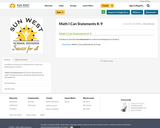
Included are all of the I Can Statements for math from Kindergarten to Grade 9.
- Subject:
- Math
- Material Type:
- Lesson
- Teaching/Learning Strategy
- Unit of Study
- Date Added:
- 10/19/2018

Included are all of the I Can Statements for math from Kindergarten to Grade 9.
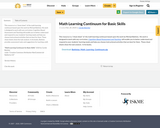
This resource is a "cheat sheet" of the math learning continuum based upon the work by Michael Battista. His work is designed to work with any curriculum, Cognition-Based Assessment and Teaching will enable you to better understand and respond to your students’ learning needs and help you choose instructional activities that are best for them. These cheat sheets show the task analysis. In his books, Battista provides assessment tasks and suggestions for teaching a skill.
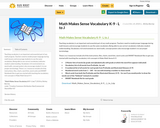
Teaching vocabulary is an important and essential part of any math program. Teachers need to model proper language during math lessons and encourage students to use the same vocabulary. Being able to use correct vocabulary indicates student understanding. Vocabulary rich environments ex: word walls, concept posters also encourage student's to use proper terminology.
These L to J resources include all of the instructions, files, charts, word lists, word cards and SMART Notebook files to get you started with teaching the vocabulary rich concepts in Make Math Sense K-9.
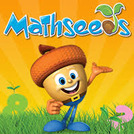
This Mathseeds parent pack has all of the information you need to get started using the program at home. The brochure includes an overview of how to use the student console, the top 7 tips for using Mathseeds to support your child’s learning at home, and how the Mathseeds lessons work.
Mathseeds teaches kids aged 3-9 the core math and problem solving skills needed to be successful at school with fun, highly interactive and rewarding lessons.
Mathseeds combines highly structured lessons with fun motivational elements that keep children engaged and keen to learn.
Your kids can start learning with Mathseeds anytime and anywhere there is a computer or tablet.
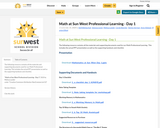
The following resource contains all the materials and supporting documents used for our Math Professional Learning. This includes the actual PPT presentation as well as the supporting handouts and checklist.
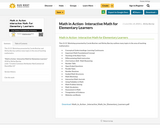
This 21 CC Workshop presented by Carole Butcher and Shirley Barclay outlines many topics in the area of teaching mathematics.
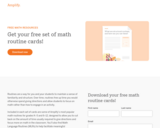
Routines are a way for you and your students to maintain a sense of familiarity and structure throughout the school year. Having a core set of shared routines can create a powerful, practical force for establishing a classroom learning community.
The instructional routines you’ll find throughout Amplify's math program help bring structure and consistency to your classroom, freeing up some of your valuable time. Each card features an easy-to-implement practice to keep students interacting and engaged with the lesson.
Download your free instructional routine cards today. The routines are listed in the tags for this resource.

Ressource numérique de la province de Québec: de nombreuses vidéos présentant de l'enseignment de compétences essentielles en langue et en calcul, organisées par niveau scolaire. Du matériel pour les Sciences et les Sciences humaines au niveau secondaire. Comprend aussi des séries « Astuces pour réussir » destinées aux jeunes!
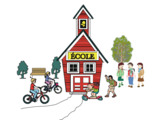
Provided by the Saskatchewan Teachers' Federation / le Ministère de l'Éducation de la Saskatchewan: 'Students have an opportunity to discuss themselves and their school. During the learning activities, students will explore various topics related to them and their school while preparing a booklet ... students create booklets pertaining to “Me and My School” and present an accompanying role play.'

Marie Hartford's class of 5th grade scientists learn about the importance of water quality and its benefits to wildlife and the environment. Within the narrow confines of pH necessary for their tank of red-legged frogs, students use a combination of pond and tap water to keep the tank healthy, using their collected data to make the decision on the proportion between the two.

These guides are designed by the Global Digital
Citizen Foundation to help you gain a better
understanding of the 21st Century Fluencies and
how they work.
This guide contains a description of the stages of
Media Fluency, as well as a perspective on the skills
each stage develops and why they are important for
our students?and everyone?to learn.
We hope this information will help you with the
development of the Fluencies as you work to infuse
them into your students' learning experiences

MediaSmarts has been developing digital and media literacy programs and resources for Canadian homes, schools and communities since 1996. Through our work we support adults with information and tools so they can help children and teens develop the critical thinking skills they need for interacting with the media they love.
Resources are available for the following areas:
Crime Portrayal
Sexting
Blogging
Media Literacy 101
Internet & Mobile
Alcohol Marketing
Environment
Visible Minorities
Cyberbullying
Aboriginal People
Resources
Educational Games
Lesson Plans
Licensed Resources
Media Literacy Week
Outcome Charts by Province & Territory
Tip Sheets
Tutorials & Workshops
YouTube Videos
Recently on MediaSmarts
Knowing My Password
Doing Good with Social Media
Reality Check: The Game

This Website allows you to directly locate and find lessons through the SK curriculum and has specific activities aligned with a number of different SK Subject Outcomes.
- Arts Education
- Career Education
- Social Studies
- Science
- Math
- Health
- Practical and Applied Arts
- Cross-Curricular Competencies
- ELA
- Communication Media
Grade 6 Specific Health Related Activities:
o Avatars and Body Image USC6.1
o Gender Stereotypes and Body Image USC6.1 USC6.2
o Image Gap USC6.1
o Introduction to Cyberbullying: Avatars and Identity USC6.1 USC6.2 USC6.5
o Kids, Alcohol and Advertising – Lesson 1: Messages About Drinking USC6.7
o Kids, Alcohol and Advertising – Lesson 2: Young Drinkers USC6.7
o Kids, Alcohol and Advertising – Lesson 3: Understanding Brands USC6.7
o Kids, Alcohol and Advertising – Lesson 4: Interpreting Media Messages USC6.7
o Media Kids USC6.2 USC6.5 USC6.7
o Media Minute Lesson 2: Media are constructions USC6.2 USC6.7
o Mirror Image USC6.2 USC6.1
o Pay for Play USC6.7
o Prejudice and Body Image USC6.1 USC6.5
o Stereotyping and Bias USC6.1 USC6.2
o Tobacco Labels USC6.7
o Understanding the Internet: Communication and Social Media USC6.7
Educational Games:
o Data Defenders
o A Day in the Life of the Jos (same as above – paid for program) USC6.1 USC6.2

TED Studies, created in collaboration with Wiley, are curated video collections 逍 supplemented by rich educational materials 逍 for students, educators and self-guided learners. In Covering World News, media executives, journalists and authors explore how our ability to understand and participate in a global society is helped or hindered by Western media coverage of world events. As technology and a tough economy change the way mainstream media companies do business, will international news be an albatross or an asset?

TED Studies, created in collaboration with Wiley, are curated video collections 逖 supplemented by rich educational materials 逖 for students, educators and self-guided learners. The speakers in Rethinking Cancer give the talk of their lives about the prevention, detection and treatment of one of the leading causes of death worldwide: cancer. In this course, you逭ll question fundamental concepts about what cancer is and rethink how cancer research should be conducted.

Marcella Bird teaches about the meaning of the Medicine Wheel.

1 in 5 Canadians Experience Mental Illness in Any Given Year. We All Know Someone.
And yet, one of the biggest issues in our health care system – and society at large – is that mental health is not taken as seriously, and treated as urgently, as physical health. But when you hear the stories, and see the impact mental illness has on the lives of so many around us, it's hard to stand idly by. Together, we can and must change the way mental health is treated not just in Canada, but around the world. We invite you all to join the movement. Watch the videos. Share the content. Donate now.
#MentalHealthIsHealth
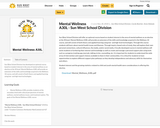
Sun West School Division has developed an optional course based on student interest in the area of mental wellness as an elective at the 30 level. Mental Wellness A30L will provide an extension of the skills and knowledge acquired in the Wellness 10 course, and will consist of both theory and applied learning using low- and high-level technologies.
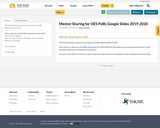
The following slides summarize some aspects of PeBL implementation at OES.
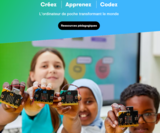
Aperçu : Apprenez comment mettre en marche le micro:bit, programmez ses fonctionnalités et créez vos premiers projets.
Le micro:bit de la BBC est un ordinateur de poche qui vous initie au fonctionnement conjoint du logiciel et du matériel. Il dispose d'un écran à LED, de boutons, de capteurs et de nombreuses fonctionnalités d'entrée/sortie qui, une fois programmées, lui permettent d'interagir avec vous et votre environnement.
L'informatique dans votre salle de classe - Le micro:bit facilite la réussite immédiate en programmation. Il est idéal pour des introductions simples et concrètes aux technologies numériques et informatiques. Il aide les élèves à comprendre ce que sont les technologies numériques et informatiques et comment elles fonctionnent.